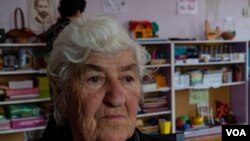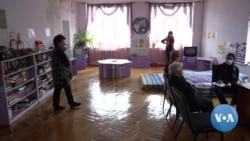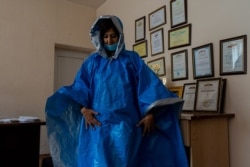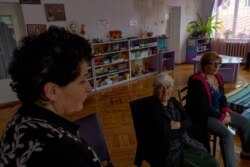After a bomb blast about four days ago, Angela Hovakimyan, 83, and her two daughters fled their homes in the Nagorno-Karabakh region, where Armenia and Azerbaijan have been fighting for nearly two weeks.
Two people died in the blast, and much of the house was destroyed.
“Everything fell on my head,” Hovakimyan said Thursday in a kindergarten-turned-temporary shelter. “The doors, the windows.”
One of her daughters, Evelina Sangsyan, pulled up the sleeve of her mother’s black cardigan, revealing what appeared to be small cuts from the blast. Hovakimyan quickly pushed it down.
“There are thousands in my condition,” she said, scolding. “Are we all going to die in … other people’s homes?”
Peace talks are set to begin in Geneva, but the fighting in Nagorno-Karabakh appears to be intensifying, with thousands of people fleeing into both Armenia and Azerbaijan.
Azerbaijani forces recently took over several villages and settlements in the largely self-governing enclave, which lies within its internationally recognized borders but is populated mainly by ethnic Armenians who call it the Republic of Artsakh.
Azerbaijan describes the territory as “illegally occupied,” but Armenia says it is an independent region under the protection of Armenia and that no significant amount of land has been gained or lost in this conflict.
Off-and-on conflict between Azerbaijan and Armenia over the fate of Nagorno-Karabakh began roughly 30 years ago, after the Soviet Union fell and new borders were drawn. But this fight is different than other clashes that have occasionally flared up since the 1990s, according to Armenian officials.
“This is a large-scale war,” Artsrun Hovhannisyan, a spokesperson for the Armenian Ministry of Defense, said in a press conference Wednesday. “In the past 20 or 30 years, there has not been such dense military activity.”
Fleeing conflict
Upstairs at the kindergarten/shelter, Ela Housepyan, 81, was furious when asked why she left her home in Nagorno-Karabakh.
She fled because her house was shaking from airstrikes, she said, but she will not stay away long, regardless of the danger.
Her small farm is in danger, and years of on-and-off war has made her desperately lonely and increasingly poor.
“So many of my relatives have died in this war,” she explained. “What will happen to my family? This needs to finish.”
Dozens of civilians have been killed, and each side accuses the other of deliberately targeting populated areas. At least four children have been killed and seven injured, according to the U.N. Children’s Agency.
A network of volunteers has mobilized in Armenia, supplying food, clothing, medicine and living quarters to displaced families. There is little to no international help available, according to Jasmine Khachatryan, who normally heads the kindergarten, but is now coordinating volunteers to help displaced families sleeping in the school.
People continue to arrive daily, she said, traumatized and terrified.
“We have found everyone in a very hard situation,” she added. “They are under great stress.”
International involvement
Back on the ground floor, Hovakimyan and her daughters said they hope more countries will get involved and support their side.
“It will make a difference,” said Evelina Sangsyan, one of the daughters. “But I am a librarian. I don’t speak about politics.”
Observers fear that interference from outside countries may escalate the conflict, drawing major powers like Turkey, Russia and Iran into yet another proxy war on foreign soil.
The European Union says there is no possible way to resolve the conflict militarily and that disinformation from both sides could be used to draw other countries into the war.
“At this stage, further escalation of the conflict and involvement of regional actors, unhappily, cannot be excluded,” Josep Borrell, the high representative of the European Union, said in a statement Wednesday. “This would seriously threaten the stability of the whole region.”
International mediators are meeting in Geneva and Moscow in the coming days with representatives of both Armenia and Azerbaijan, separately.
At the shelter, young people said they don’t see this conflict ending any time soon. They see the potential loss of Nagorno-Karabakh as a threat to their existence as a nation.
Azerbaijan is steadfast in its claim that Nagorno-Karabakh is within its borders and wants long-displaced Azerbaijanis to be free to return to the region.
Sixteen-year-old Arsen Abunts, a volunteer at an aid distribution center near the kindergarten, said he expects the war to continue for the next two years, when he is old enough to volunteer to fight. When asked if he wants to join the battles, Abunts grinned.
“For sure, I will join,” he said.











